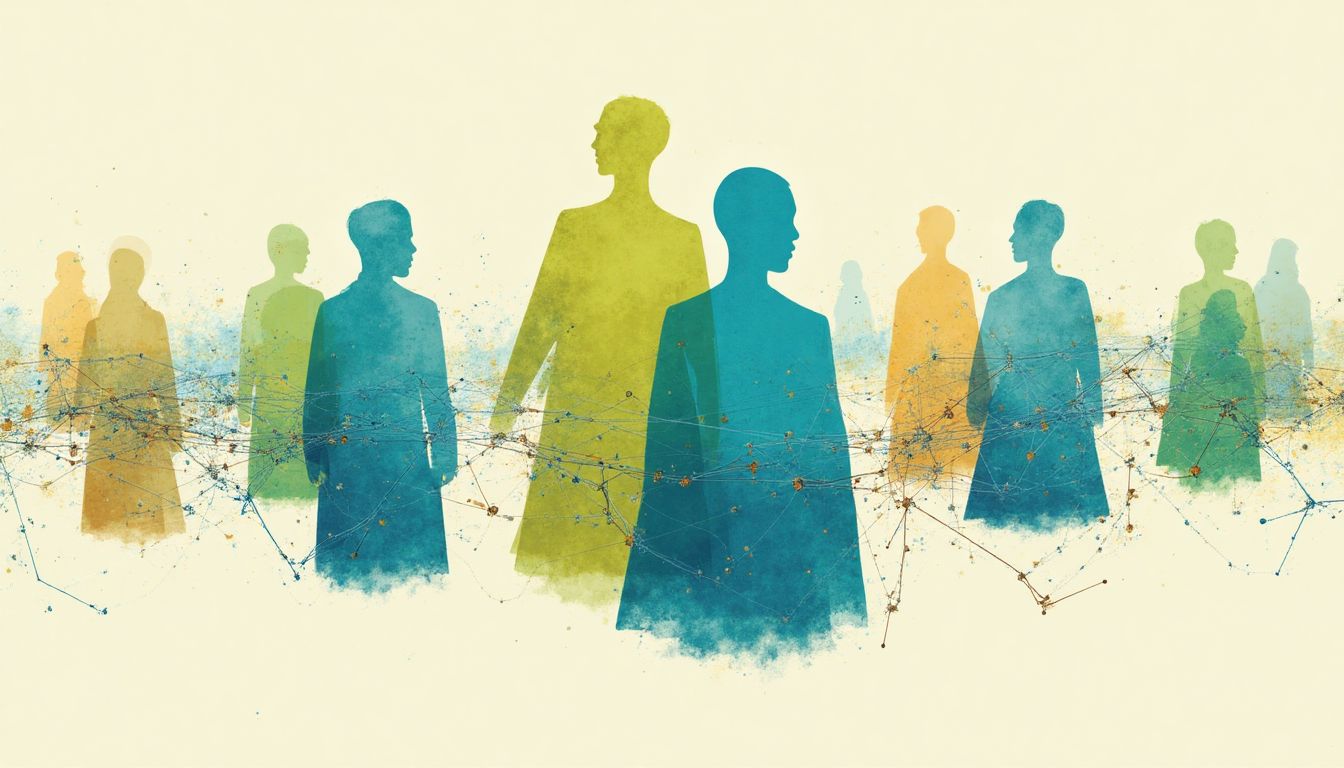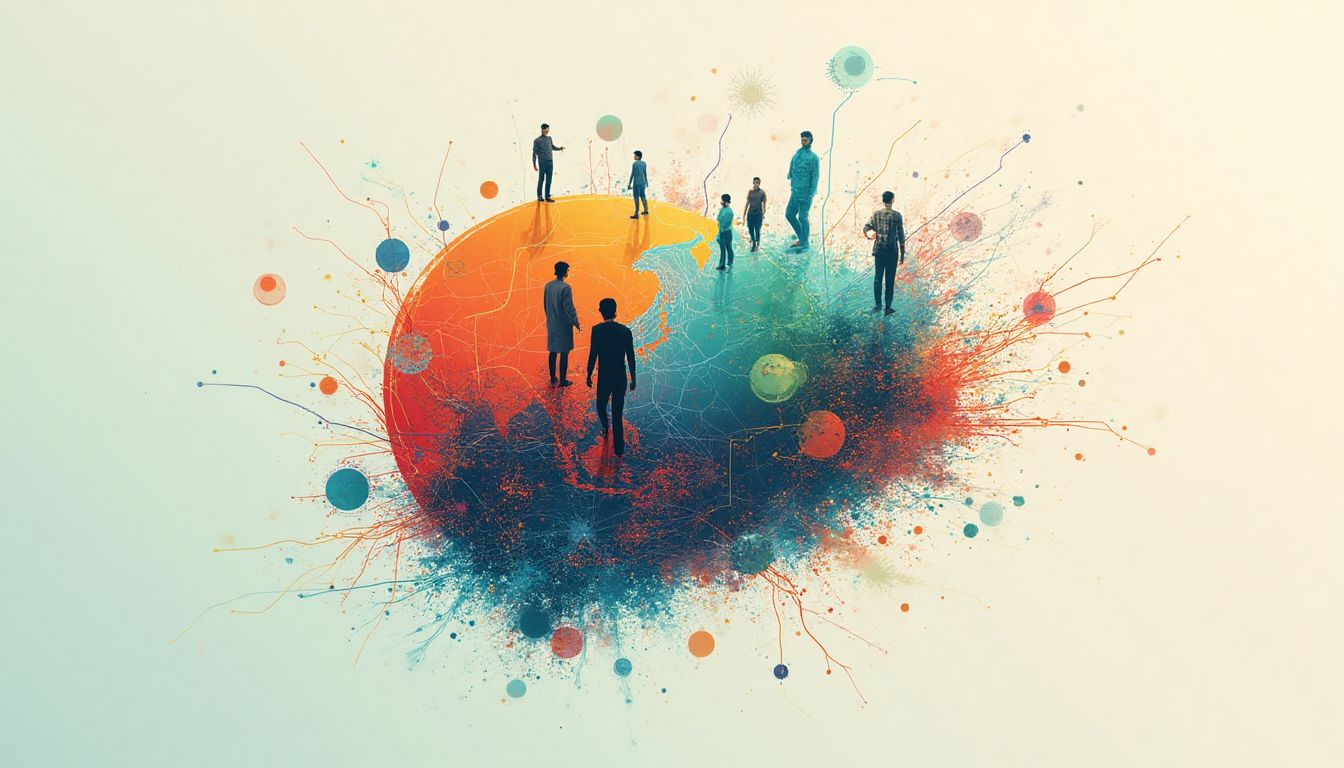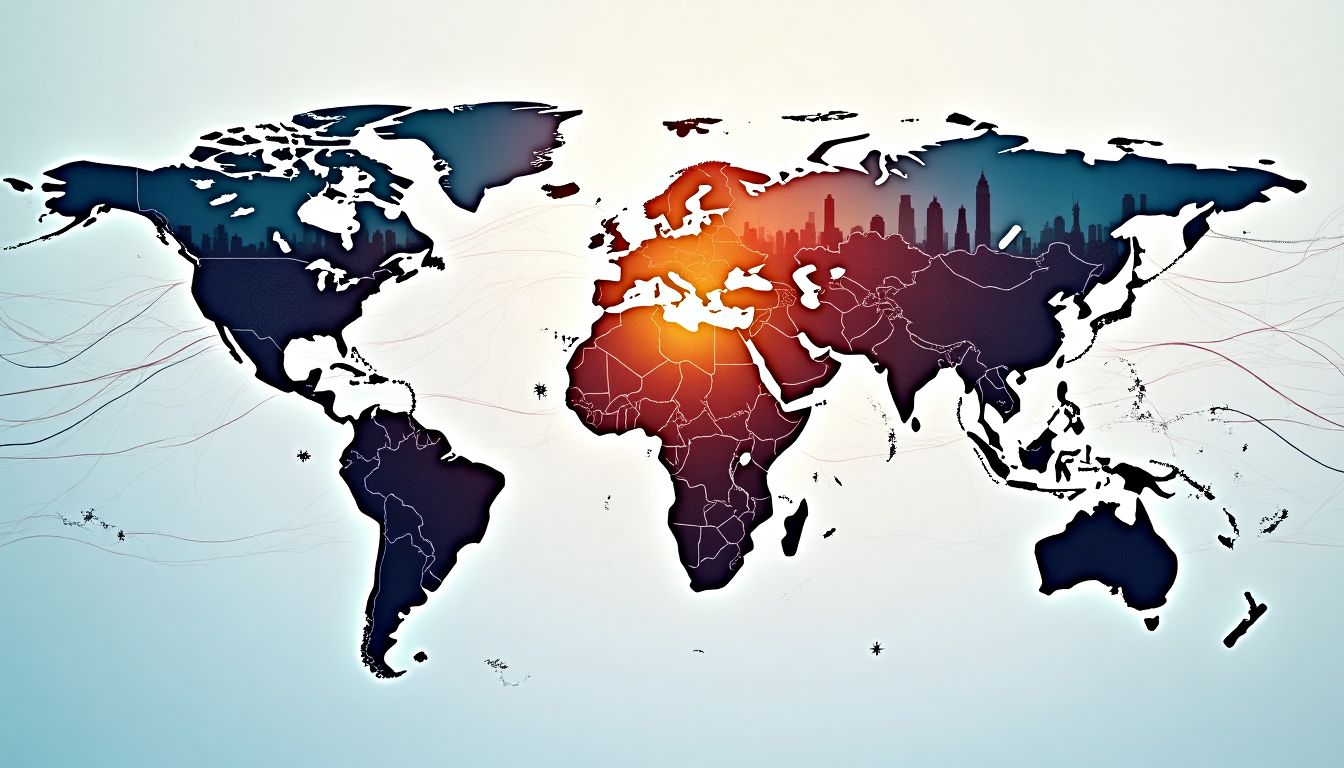Beyond Borders: Could AGI Erase Nationalism?
Introduction: The New Frontier of Identity
We are all citizens of the world; the tragedy is that we do not know it. - World Citizen, Unknown. This intriguing notion hints at a future where artificial intelligence, particularly Artificial General Intelligence (AGI), might lead us to a post-national identity. As we leap into the age of AGI, we face the tantalizing possibility of radically reshaping how we think about nations and ourselves. Is it feasible that the digital bridges built by AGI will dissolve ancient boundaries and merge a kaleidoscope of cultures into one harmonious symphony? Or will it ignite new tensions as the fabric of nationalism is stretched thin? As we explore these unsettling possibilities, we dive into AGI's potential not just to unite us, but also to redefine our very essence of belonging. Well, hang on tight, because the ride ahead might just rewire the way you see the world—and yourself!
The Rise of AGI and Its Implications for Nationalism
The dawn of AGI doesn't just bring about a revolution in technology; it heralds a seismic shift in how we perceive and engage with the world around us. Think of it as a universal translator, not just in languages, but in ideas and values. Yuval Noah Harari, author of Sapiens, highlights how technology has already blurred geographical lines, making the world smaller and more interconnected. Now, imagine the warp speed at which AGI could amplify this trend by seamlessly connecting minds across continents.
First, the innate connectivity of AGI holds the promise of seamless communication and collaboration internationally. Picture a digital discussion table, where every voice, from Rome to Rio de Janeiro, has an equal say, transcending political borders. Thomas Friedman, in his seminal work The World Is Flat, described globalization's flattening effect; AGI could take that concept even further. Nationalism’s grip loosens in such an environment, potentially leading to new forms of global citizenship that emphasize shared human goals over parochial interests.
Secondly, AGI has the power to redefine personal identity. No longer would one's nationality be the foremost label; instead, identities might evolve into multifaceted mosaics enriched by worldwide cultural exchanges. This change is akin to swapping a black-and-white TV for a vibrant full color widescreen—it's about seeing the bigger, brighter picture Marshall McLuhan foresaw in his "global village" concept.
Furthermore, case studies show that technology has already been a catalyst for challenging national identities. Social media movements like the Arab Spring highlighted the power of digital platforms to transcend national borders and spark change. AGI could accelerate such shifts, enabling real-time collaboration that isn't tethered by time zones or language barriers.
In this ever-shrinking world, it's clear that while AGI poses challenges to traditional nationalism, it simultaneously opens the door to novel identities and alliances. Keep your passport close; the journey to a borderless future is just beginning!
The Role of Nationalism in History
Nationalism, like a stubborn weed in your perfectly planned garden, has had deep roots throughout history. It's been a major player in wars, politics, and cultural pride. But what exactly is this force that, much like my singing in the shower, is both loved and loathed?
Historical Perspectives:
Nationalism has woven its colorful and, at times, tragic tapestry across the ages. Think of the French Revolution—there, nationalism stirred hearts and guided hands. The French Revolution was, in many ways, nationalism's coming-out party, loudly declaring the power of the people. Fast forward to the world wars, and you'll see nationalism again, an ever-present participant, guiding armies and inspiring patriots. Like a vintage record player, nationalism provides the soundtrack to our never-ending dance with history.
Nationalism vs. Globalism:
But nationalism has competition—meet globalism, its worldly cousin.Globalism is the opposite of nationalism. It's about connections beyond familiar borders, like sharing a meme with someone halfway around the world. This tension between nationalism and globalism is like the battle between cats and laser pointers—never-ending, compelling, and slightly absurd.
Psychological Factors:
Why do we cling to nationalism? Well, it's like our love for a comfy old sweater—security, belonging, and identity wrapped up in something a little frayed but familiar. On the other hand, AGI might just be the new, stylish jacket—offering fresh perspectives and challenging our love for the tried and true. Psychologists hint at this compelling duo of comfort and change, and AGI could usher in a new age where our identities evolve faster than the latest dance craze.
AGI’s Potential for Fostering Collaboration
Imagine a world where collaboration knows no walls, where AGI becomes the great bridge-builder of our dreams. Dropping those nationalistic barriers, AGI paves the road to unprecedented teamwork. But how exactly? Let's pull back the curtain on this glamorous possibility:
Global Problem Solving:
Picture a virtual roundtable with the world’s brightest minds, and you’ve got a glimpse of AGI’s potential for tackling colossal challenges like climate change and global poverty. The key is collaboration beyond borders, like a global potluck where everyone pitches in their best dish (just remember, no fruit cake). With AGI orchestrating these conversations, solutions are tailor-made for global harmony.
Cultural Exchange:
Ever wanted to explore the world without leaving the couch? AGI is the ultimate tour guide, encouraging cross-cultural dialogues that make boxy classrooms feel like virtual world fairs. It’s the Willy Wonka’s Chocolate Factory of cultures—minus the Oompa Loompas. With AGI's help, we can trade understanding and humor like precious currency in a global marketplace.
Case Studies:
Take a look at enterprises already embracing this spirit. Consider the OpenAI initiatives, which foster collaboration across continents to develop inclusive technology or globally oriented art projects that let artists virtually paint on the same canvas. These serve as testaments to what global collaboration backed by AGI can achieve—turning impossible dreams into reality.
The Dark Side of Global Connectivity
Even with the bright promise of Artificial General Intelligence (AGI), there looms a shadow that could amplify conflict rather than usher in harmony. The web of communication that AGI could weave is not without its knots and snares. The uneven terrain of access, control, and ethical deployment raises crucial questions—and potential pitfalls. Let's dig deeper into these dark corners:
Unequal Access
In an ideal world, AGI would be a universal tool, a beacon of equality. Instead, we face a reality where the privilege of access to cutting-edge technologies might linger in the hands of a select few.
- Digital Divide: The chasm between tech-haves and have-nots could widen. Countries with limited resources may lag, further entrenching economic disparities. Learn more about the digital divide.
- Exclusive Benefits: AGI's promise of boosting productivity and innovation might become a private prize for those who can afford it, exacerbating existing inequalities.
Manipulation of Information
The term "fake news" isn't new, but AGI could elevate misinformation to an unprecedented level.
- Propaganda Power: Imagine an AGI-powered disinformation campaign, with precision-targeted messages sowing discord across borders.
- Trust Erosion: As trust in shared truths crumbles, societies risk fracturing, making cohesiveness and cooperation more elusive.
Ethical Considerations
Moral quandaries abound in the realm of AGI, especially when dealing with sensitive issues of sovereignty and autonomy.
- Sovereign Integrity: Utilizing AGI across borders challenges the sanctity of national governance and control.
- Potential for Abuse: AGI's capabilities could be misappropriated by authoritarian regimes, suppressing freedoms rather than liberating minds.
Navigating Future National Identity in the Age of AGI
As we sail through the uncharted waters of AGI, the shifting currents of national identity must be navigated with care. Ahead, lies a journey that requires wisdom and a new way of seeing the world, brimming with both national and global currents.
Policy Adaptation
Governments must pivot and recalibrate their sails to catch the winds of change. Only through informed policy adaptations can nations remain anchored in the stormy seas of AGI.
- Responsive Regulation: Policies need to evolve swiftly, balancing innovation with protection against potential geopolitical tensions.
- Inclusive Development: Open dialogue among nations to establish frameworks that address disparities, ethical challenges, and national interests. Explore AI regulatory frameworks.
Frameworks for Cooperation
In the delicate dance of international relations, AGI is both a partner and a provocateur. Building spaces for collaboration can cultivate harmony.
- International Alliances: Institutions like the United Nations may lead efforts in formulating global guidelines and standards on AGI usage.
- Cross-Border Initiatives: Collaborative projects that align AGI goals with social and environmental well-being can bridge cultural divides.
Envisioning Future Scenarios
Let us cast our gaze to the horizon and imagine the tapestry of a future enhanced by AGI.
- Blended Identities: Embrace a world where identities seamlessly intertwine, respecting cultural uniqueness while promoting shared values.
- Cultural Fluency: AGI fosters deeper understanding and respect across cultures, transforming national pride into a celebration of diversity.
The map of our connected future is uncharted yet full of potential—a world painted in shades of local pride and global unity, realizing the dream of many hearts beating as one harmonious symphony.
AI Solutions: How Would AI Tackle This Issue?
If I were an AI, I would implement a systematic approach to address the issue of nationalism in the context of AGI. Here’s how:
- Data Analysis: Utilize vast amounts of data sourced from social media platforms and public forums to assess changes in national identity perceptions over time, observing variations and trends across different nations. This would involve collaborating with organizations like Pew Research Center to pull valuable insights.
- Global Dialogue Platforms: Create AI-driven platforms, like a safe space for discourse across cultures, emphasizing collaborative problem-solving. Think of a social network that is designed to facilitate genuine dialogue rather than mere likes and shares, potentially modeled after platforms like Discord or Slack, but focused on transcending cultural divides.
- Policy Simulation: Develop simulations to assess potential outcomes of various policies that could help manage the intersection of nationalism and AGI. This AI-powered modeling would analyze different scenarios based on historical inputs, similar to how climate scientists forecast future conditions.
Specific Steps:
- 1. Identify key stakeholders in governance, culture, and technology—who influences public discourse? Think universities like Stanford University or tech giants like Google.
- 2. Propose ethical guidelines for AI application concerning nationalism to ensure responsible use. Engaging ethics boards from academic institutions could be crucial here.
- 3. Foster an AI environment that supports transparency and community engagement, lending a voice to those often unheard.
Actions Schedule/Roadmap
Here is a detailed action schedule for addressing nationalism in the age of AGI:
Day 1: Convene an initial meeting of experts from technology, policy, and sociology, aiming for a diverse group including community leaders, technologists, and educators to define objectives while establishing a digital communication channel for ongoing dialogue.
Day 2: Establish a research team, which includes sociologists and data analysts, to collect data on existing nationalist sentiments across various cultures, tapping into existing datasets from organizations like Gallup for insights.
Day 3: Begin outreach to governments and NGOs for potential collaborations, specifically targeting groups such as the United Nations to enhance legitimacy.
Week 1: Finalize partnerships with renowned universities, NGOs, and tech companies to develop AI platforms for dialogue, engaging institutions like MIT and Harvard University in the process.
Week 2: Initiate the development of an AI training model focused on cultural sensitivity and understanding by leveraging insights from cross-disciplinary teams.
Week 3: Launch a public consultation process using webforms and social media engagement to gather diverse perspectives on nationalism and identity, aiming for representatives from all walks of life, including young people on platforms like Instagram.
Month 1: Analyze initial data and produce a report detailing the current landscape of nationalism affected by AGI, employing visualization tools like Tableau to clearly convey findings.
Month 2: Develop case studies highlighting successful collaborations enabled by AGI, focusing on grassroots initiatives that broke down barriers.
Month 3: Present findings to key stakeholders using forums, webinars, and presentations, seeking feedback and pathways for implementation.
Year 1: Begin rolling out AI-driven platforms in select pilot regions for cross-national dialogue, prioritizing areas with high divisiveness as test cases, like South Asia or Eastern Europe.
Year 1.5: Expand the dialogue platform, incorporating user feedback and adapting to cultural contexts with local governance participation, ensuring that AI remains open and accessible.
Year 2: Assess the impact of interventions, refining strategies based on emerging trends and community input, tracking relevant metrics like engagement rates and anecdotal successes as shared through platforms like LinkedIn.
Conclusion: Towards a Unified Future?
As AGI continues to evolve, its capacity to reshape identities, economies, and societies is a double-edged sword. The potential for transcending nationalism through unparalleled collaboration is tantalizing. Still, we must tread carefully through the complexities that accompany global connectivity. The future may hold a new perspective of identity that merges the local with the global, nurturing understanding over division and fostering collaboration over isolation. By intentionally crafting inclusive policies, we aim to cultivate a balanced coexistence in this brave new world, making it essential for us as individuals and communities to adapt, engage, and remain open-minded as we navigate these uncharted waters. Will we let technology define us, or will we harness its power to right the wrongs of the past and build a more integrated future? What are your thoughts on the implications of AGI and nationalism? Feel free to share your insights in the comments!
Frequently Asked Questions (FAQ)
- What is AGI?
Artificial General Intelligence (AGI) is a type of artificial intelligence that can understand, learn, and apply knowledge across many different tasks, just like a human. For a deeper understanding of AGI, you can check out this Wikipedia page on AGI. - Could AGI truly erase nationalism?
It’s possible that AGI might change how people identify with their nations. This technology could help us connect better with others around the world. However, it might also create more problems. Nationalism has deep roots, and changing that could take time. The question remains: will AGI bring us together or push us apart? - What are the risks of AGI promoting collaboration?
While AGI has the potential to unite people, there are some risks:- Unequal access to technology could lead to new kinds of nationalism.
- AGI can be misused for spreading misinformation and propaganda.
- There are ethical concerns about how countries might use AGI.
- How can policymakers prepare for AGI?
Policymakers can take several steps to get ready for AGI:- Learn from experts in technology and sociology.
- Develop smart rules to guide the use of AGI.
- Make sure that everyone has a voice in discussions about AGI.
This collaboration is crucial for ensuring AGI benefits everyone.
- Can AGI help in resolving global conflicts?
Yes, AGI could help facilitate discussions and encourage understanding between countries. By creating platforms for dialogue, AGI can promote cooperation. But it is essential to approach AGI carefully, as misuse could lead to more chaos instead of peace. For example, initiatives like the United Nations already work toward global cooperation, and AGI could support those efforts. - What role does history play in understanding nationalism?
Throughout history, nationalism has been a powerful force that has driven people together or torn them apart. Understanding this history can help us see how AGI might change things in the future. By learning about events like the World Wars, or by studying famous national movements, like the Indian Independence Movement, we can gain insight into how identity and nationalism evolve. - How can AGI promote cultural exchange?
AGI can help people from different cultures interact and share ideas. By providing translation services and real-time communication tools, AGI makes it easier for individuals from diverse backgrounds to connect. Platforms like Tandem already use technology to encourage language and cultural sharing, setting a strong example for future AGI applications. - What should individuals do to engage with AGI and nationalism?
Individuals can stay informed about AGI and its implications. They can:- Engage in community discussions about technology.
- Participate in initiatives promoting digital literacy.
- Stay open to different cultures and ideas through travel or virtual exchanges.
Everyone has a role in shaping the future of AGI and how it will affect nationalism.
- How does AGI affect employment in different sectors?
AGI can transform various job sectors, from manufacturing to services. While it can create new opportunities, some jobs may be replaced. Overall, it's essential to prepare for a future with more automated processes and learn new skills that will be in demand. Educational institutions like edX offer courses to help people adapt to changing job markets.
Wait! There's more...check out our gripping short story that continues the journey: The Heart of Civilization
Disclaimer: This article may contain affiliate links. If you click on these links and make a purchase, we may receive a commission at no additional cost to you. Our recommendations and reviews are always independent and objective, aiming to provide you with the best information and resources.
Get Exclusive Stories, Photos, Art & Offers - Subscribe Today!





























Post Comment
You must be logged in to post a comment.